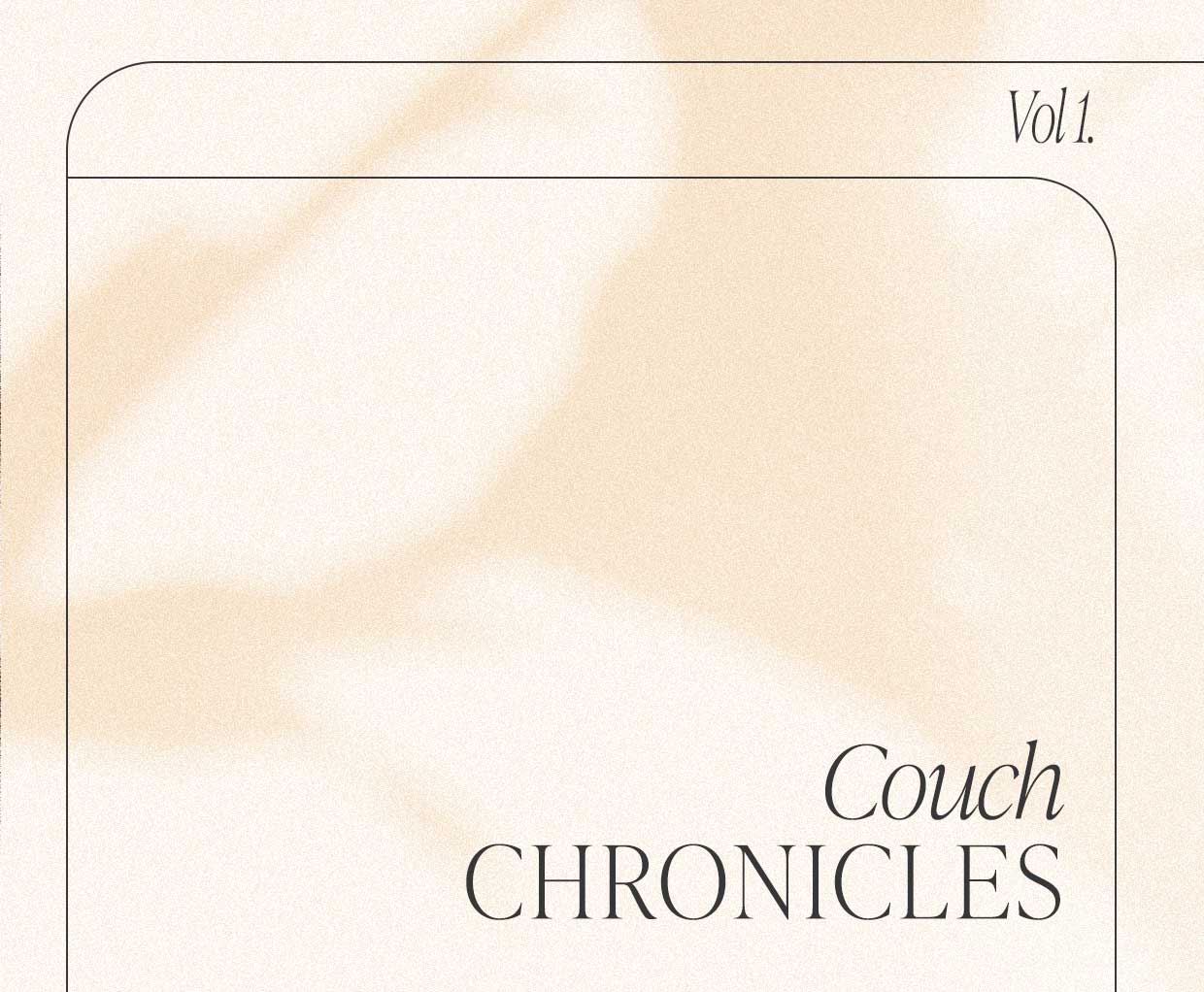Nestled in the heart of NYC’s West Village, the therapists at Atrium Psychotherapy invite you on a journey of self-discovery and emotional exploration. "Couch Chronicles" is more than just a column; it's a tapestry of human experiences, woven with tales of growth, transformation, love, and loss.
Each installment offers fresh insights and reflections from their professional and personal lives in one of the world's most dynamic cities. Whether you're seeking guidance, inspiration, or a deeper understanding of the intricate world of psychotherapy, "Couch Chronicles" promises to be a beacon of light and learning.
Yesterday, I was walking through downtown Manhattan, and splashed in bold-font (all caps) across a banner in a boutique window were the words, “NEW YEAR, NEW YOU!” My stomach sank. I was overcome with the immediate weight of expectation to be new, better, best. Most notably, I was ripped away from the present moment: No longer could I feel the chill of winter air skimming my cheeks or smell the sweetness of caramel wafting from the coffee shop behind me. Could this be the source of heaviness that has plagued my clients since the day after Thanksgiving? Fraught with the pressure to achieve, I could feel my own perfectionism popping her head out to say hello.
I’m about to suggest an antidote to perfectionism that may feel a little too buzzworthy to be true: Mindfulness. When I’ve mentioned this to clients, they all look a bit itchy — and I don’t blame them. There is something allergenic about a thin, white woman in a billowy skirt telling you that energy work may support your therapeutic journey. What they don’t know is that underneath my skirt, I’m layered from shoulder to tailbone in kinesiology tape; and I spent the morning engaged in what feels like a ceremonial ritual just to make it to the office in one piece. And every individual I sit with has a story of what lengths they had to reach to get to where they are. The unseen obstacles within us are perhaps the most moving mystery of humanity. What oppresses us is so often what unites us, yet we’ve been conditioned not to speak its name. In my own story, the name I finally speak is disability. I was a ballet dancer for most of my life, which taught me how to connect with my body, shaped my self-expression, joined me with community, and most of all, defined my identity. Seven years ago, I was in an accident that caused impairment to my spine and chronic pain. Unable to find relief and unable to find myself, I was consumed by a belief that I had failed. My perfectionism was not just saying hello — she was screaming.
In our Western society, we swim in currents that are seemingly engineered to pull us away from presence and in the direction of perfectionism. Armed with our ‘smart’ devices, it has become normal to avert our eyes, standard to shorten our bandwidths, typical to prioritize the hustle, and glorified to have as many tabs open as possible. This is not togetherness; this is collective loneliness.
As a therapist in NYC, many of my clients describe that feeling of loneliness as incongruent with the amount of people they interact with on any given day. In the sea of that discord, many find themselves caught in the undertow of comparison, where their self-worth is measured against the seemingly flawless lives of coworkers on Zoom, friends-of-friends, or strangers on social media. The pull toward perfectionism becomes an inevitable plunge — a nosedive into the abyss of unrealistic expectations and unattainable standards. Just to be clear, I don’t believe that ‘perfectionism’ is a dirty word. In fact, I have found that the tendency to perfect is often developed in early childhood as a way to stay safe. As we grow, we may find that the very thing that protected us as children is no longer serving us as adults — this is usually when my clients and I find each other.
From observations in my clinical work, and my own experiences, here are some sneaky ways your own perfectionism may be saying hello to you:


COUCH CHRONICLES
The Only Thing ‘Presence’ and ‘Perfection’ Have in Common is ‘P'
By: Jill Homlish, MHC-LP
Let’s consider an ‘M’ – mindfulness.
*Your nervous system is stuck in ‘freeze’...
Perfectionism is often associated with fear of failure or judgment, so it has the potential to send our nervous system into a stress response, known as ‘freeze.’ This may look like:
- Procrastination
- Feeling paralyzed or numb
- A sensation of rigidity (in body, mind and/or spirit)
- Dissociative activities like mindlessly scrolling social media
All these behaviors block us from action. A great deal of the work in therapy entails finding ways to regulate the nervous system in order to uncover our authenticity.
*Your inner critic is in the driver’s seat...
In Internal Family Systems Therapy (IFS), the Inner Critic is considered a part of us spinning a narrative that often evokes shame and anxiety. A run-in with your inner critic may involve:
- Replaying a painful message from your past (“You’re not good enough”)
- Experiencing insecurities that mirror ones felt during childhood
When we encounter that inner critic in therapy, we hand them the mic! Once we hear what the critic has to say, we can see what emerges.
*Your internal world doesn’t match your external world…
What I’ve noticed — in my work and in my life — is that the energy spent keeping up the facade of perfectionism only intensifies our turmoil. When our inside and outside are misaligned, we might:
- Find ourselves being dishonest about our emotions, even in our closest relationships
- Feel caught in a cycle of seeking external validation
- Become burnt out from expending energy to keep up appearances
The therapeutic process here is in cultivating synergy between our emotional experience and the face we show the world. What keeps us from allowing ourselves to be seen?
A few years after the accident, my physical therapist suggested that I practice yoga. With the help of a mental health counselor, I was able to move out of ‘freeze’ just enough to try...As I entered my first class, I could hear the bellow of internalized ableism incessantly tying my worth to what I could physically accomplish. I sat on the mat, and the instructor explained that we’d begin with the intention of accessing presence. I closed my eyes...my muscles gripped to my spine. I had never purposefully sat with myself in that way, and I felt what I often feel: pain. I was so afraid that if I moved or (worse) gave voice to this reality, I’d unravel. When I reflect on that moment, I’m reminded that for many of my clients, this is similar to the emotional conflict that comes up at the beginning of therapy...how resistance can often be the beginning of healing. The instructor was so attuned to her students that she did not need my voice to feel my pain. I braced for her judgment — for her to implore me to hold the position exactly as it was intended. Instead, she brought me a bolster and a few extra blankets and told me that although my suffering might be inevitable, my attachment to it was an option.
I was so excited to finally move again, and I noticed that conjuring presence beforehand truly helped. In typical Virgo fashion, I imagined that if I could make my mindfulness practice completely (you guessed it) perfect, that would turn a magic internal key; and once I turned that key, I’d be healed. What I realized was that to be truly present is to be alive in all our imperfections. My instructor and I continued practicing together: She shared her conception of Buddhist philosophy, centering on pain and limitations as an accepted part of the human experience; and I began to study Karma Yoga, which posits that the unifying force for human beings is our need to be free.
Based on my personal journey with the present moment, and with my clients, here are some common misconceptions about mindfulness — and what actually might happen instead...It’s not as buzzworthy as one might think:
*Mindfulness = bliss...
Sometimes, the present isn’t pleasant. But it will most certainly remind you of two things:
1) You are safe.
2) You are alive.
When I sat on that mat and really checked in with myself, the sensation of pain was a sign of life. And despite the ache, the threat was gone. In a mindfulness practice, we discover a myriad of sensations and emotions ranging from discomfort to boredom, to joy, to fear, to worry. I view these emotions and sensations as states of being — fleeting, perhaps to return, and if chronic, the intensity will undoubtedly shift because as we mortals know in our bones: Nothing is forever. The inverse of that: Everything is for a moment. This is freedom.
*True mindfulness is reserved for yogis, healing practitioners, and gurus...
Despite the ways in which mindfulness has permeated our mainstream, I often sense an archetype of mastery floating around in the zeitgeist. There is much to learn from those who have dedicated their lives to practicing and educating on spiritual restoration; however, if we are solely looking at mindfulness, we are looking at the human ability to experience what’s actually happening at any given moment. This is our human right! Everyone has access to presence; it’s not sorcery. P.S. You don’t need a specific body, bank account, or level of proficiency to be living in the here-and-now — all you need is a heartbeat!
*If I get distracted during practice, it isn’t working...
What I’ve heard from many clients developing a home mindfulness practice is that they become frustrated by the inevitable distraction of street noise or memory of a past conversation ringing in their ears. I usually tell them that it’s completely normal to find your mind wandering; and instead of fighting the distraction, let those thoughts to flow in and out without judgment — this will allow the practice to unfold at its own pace. When we’re met with memories, the experience can feel a bit more intense, as the nature of some can be challenging or even disturbing. However, if we welcome those memories — and even thank them for arising — we’re offered the chance to acknowledge and process our past experiences. What comes up when we’re practicing mindfulness is asking for our attention. I believe that being open to the sensations, visions, and emotions accompanying memory allows us to complete what may be unfinished, thus integrating truths that we might not have been ready to confront before.
*Mindfulness is an individual practice...
